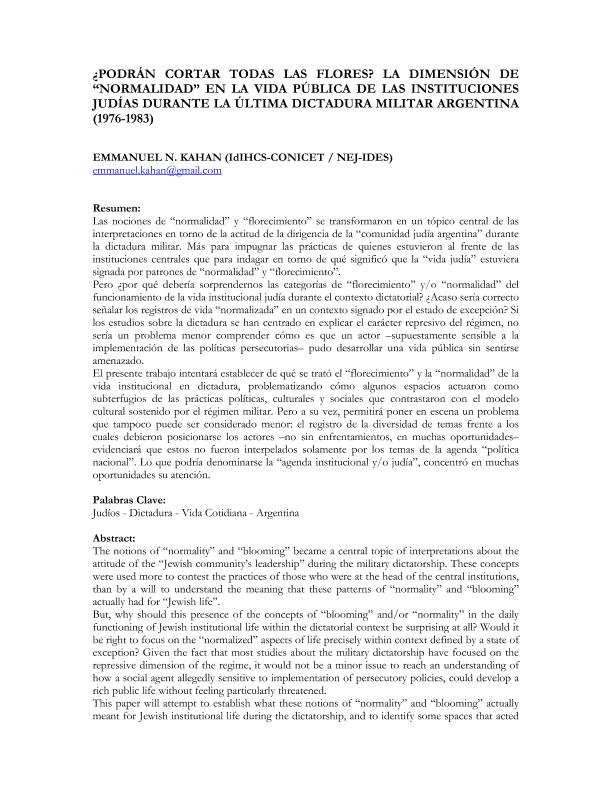Artículo
El presente trabajo intentará establecer de qué se trató el "florecimiento" y la "normalidad" de la vida institucional en dictadura problematizando cómo algunos espacios actuaron como resguardo de las prácticas políticas, culturales y sociales que contrastaron con el modelo cultural sostenido por el régimen militar. La propuesta no es en menoscabo -ni desconoce- aquellas investigaciones que señalan el rasgo más sobresaliente del período dictatorial: el terrorismo de Estado y la práctica de la desaparición forzada de personas. Pero reconociendo el debate sostenido por Martin Broszat y Saúl Friëdlander acerca de cómo abordar el pasado nazi en Alemania, este artículo retoma las consideraciones del primero acerca de la posibilidad de comprender que más allá de los registros de barbarie y horror de nazismo, existieron patrones de "vida normalizada". The notions of “normality” and “blooming” became a central topic of interpretations about the attitude of the “Jewish community’s leadership” during the military dictatorship. These concepts were used more to contest the practices of those who were at the head of the central institutions, than by a will to understand the meaning that these patterns of “normality” and “blooming” actually had for “Jewish life”.
But, why should this presence of the concepts of “blooming” and/or “normality” in the daily functioning of Jewish institutional life within the dictatorial context be surprising at all? Would it be right to focus on the “normalized” aspects of life precisely within context defined by a state of exception? Given the fact that most studies about the military dictatorship have focused on the repressive dimension of the regime, it would not be a minor issue to reach an understanding of how a social agent allegedly sensitive to implementation of persecutory policies, could develop a rich public life without feeling particularly threatened.
This paper will attempt to establish what these notions of “normality” and “blooming” actually meant for Jewish institutional life during the dictatorship, and to identify some spaces that acted as subterfuges, of political, cultural and social practices which contrasted with the cultural model supported by the military regime. But it will also attempt to shed some light on a problem that cannot be understated: the acknowledgment of the diversity of issues that the main institutional agents had to take side on –many times not without internal struggle-, showing that they were not solely influenced by the agenda of the “national political sphere”, but also by what could be defined as the “institutional” or “Jewish agenda”, to which the main actors devoted in many cases most of their attention.
¿Podrán cortar todas la flores? Acerca de los sentidos de normalidad y florecimiento de la vida institucional judía durante la última dictadura militar argentina (1976-1983)?
Fecha de publicación:
07/2014
Editorial:
Universidad del Litoral
Revista:
Contenciosa
ISSN:
2347-0011
Idioma:
Español
Tipo de recurso:
Artículo publicado
Clasificación temática:
Resumen
Palabras clave:
Judíos
,
Dictadura
,
Vida Cotidiana
,
Argentina
Archivos asociados
Licencia
Identificadores
Colecciones
Articulos(IDIHCS)
Articulos de INST.DE INVEST.EN HUMANIDADES Y CS SOCIALES
Articulos de INST.DE INVEST.EN HUMANIDADES Y CS SOCIALES
Citación
Kahan, Emmanuel Nicolas; ¿Podrán cortar todas la flores? Acerca de los sentidos de normalidad y florecimiento de la vida institucional judía durante la última dictadura militar argentina (1976-1983)?; Universidad del Litoral; Contenciosa; 2; 7-2014; 1-20
Compartir




